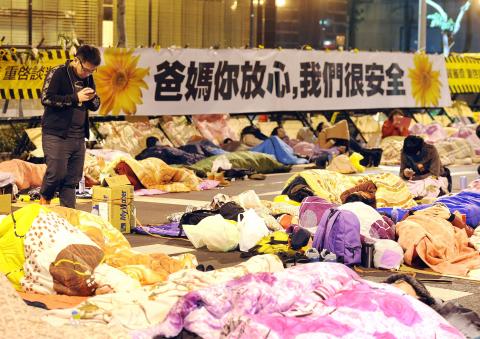The ongoing “Occupy Legislature” student protest against the Chinese Nationalist Party (KMT) and the conviction of former prosecutor-general Huang Shih-ming (黃世銘) share the same root cause — the violation of procedural justice, academics and lawyers said yesterday.
Huang resigned immediately after he was sentenced to 14 months in jail on Friday in the first trial of his case for leaking information to President Ma Ying-jeou (馬英九) in an ongoing investigation into claims of influence peddling last year.
Hundreds of students have been occupying the legislative chamber since late Tuesday over the KMT caucus’ sending of the cross-strait service trade agreement to the plenary session without substantial review in the joint committee.

Photo: Fang Pin-chao, Taipei Times
“Both cases shared the same distinctiveness of the violation of procedural justice,” Kao Jung-chih (高榮志), executive director of the Judicial Reform Foundation, said in a speech to hundreds of students who have been staging overnight sit-ins in front of the legislative compound to show support to the ones who occupied the chamber.
“Whether people supported the service trade deal with China or not, I believe the vast majority of them would oppose the opaque negotiation process and concluding the review in 30 seconds,” Kao said.
He was referring to KMT Legislator Chang Ching-chung (張慶忠), convener of the March 17 joint review committee meeting, who took advantage of Democratic Progressive Party (DPP) lawmakers’ boycott and directly sent the pact to the plenary without it being discussed.
“Huang Shih-ming’s conviction had an important implication to government officials who are about to implement measures under the cross-strait service trade agreement if the deal takes effect eventually,” lawyer Huang Di-ying (黃帝穎) said.
The conviction of Huang Shih-ming showed that public servants who committed illegal acts would be punished, the lawyer said.
As the service trade pact was sent to the plenary without review and a due legislation procedure, the pact could be declared illegal, he said.
Huang Di-ying added that the trade deal could benefit a specific group of businesspeople, so government officials who implement the agreement could violate the Anti-Corruption Act (貪污治罪條例) and would be subject to a sentence up to five years.
Both cases also taught Taiwanese a lesson, he said, that appropriate systems must be established to prevent the state and those who are in power abuse their right.
“That was why we think the Special Investigation Division should be abolished and a mechanism monitoring cross-strait negotiation and agreements should be established,” Huang Di-ying said.

Alain Robert, known as the "French Spider-Man," praised Alex Honnold as exceptionally well-prepared after the US climber completed a free solo ascent of Taipei 101 yesterday. Robert said Honnold's ascent of the 508m-tall skyscraper in just more than one-and-a-half hours without using safety ropes or equipment was a remarkable achievement. "This is my life," he said in an interview conducted in French, adding that he liked the feeling of being "on the edge of danger." The 63-year-old Frenchman climbed Taipei 101 using ropes in December 2004, taking about four hours to reach the top. On a one-to-10 scale of difficulty, Robert said Taipei 101

Nipah virus infection is to be officially listed as a category 5 notifiable infectious disease in Taiwan in March, while clinical treatment guidelines are being formulated, the Centers for Disease Control (CDC) said yesterday. With Nipah infections being reported in other countries and considering its relatively high fatality rate, the centers on Jan. 16 announced that it would be listed as a notifiable infectious disease to bolster the nation’s systematic early warning system and increase public awareness, the CDC said. Bangladesh reported four fatal cases last year in separate districts, with three linked to raw date palm sap consumption, CDC Epidemic Intelligence

Two Taiwanese prosecutors were questioned by Chinese security personnel at their hotel during a trip to China’s Henan Province this month, the Mainland Affairs Council (MAC) said yesterday. The officers had personal information on the prosecutors, including “when they were assigned to their posts, their work locations and job titles,” MAC Deputy Minister and spokesman Liang Wen-chieh (梁文傑) said. On top of asking about their agencies and positions, the officers also questioned the prosecutors about the Cross-Strait Joint Crime-Fighting and Judicial Mutual Assistance Agreement, a pact that serves as the framework for Taiwan-China cooperation on combating crime and providing judicial assistance, Liang

US climber Alex Honnold left Taiwan this morning a day after completing a free-solo ascent of Taipei 101, a feat that drew cheers from onlookers and gained widespread international attention. Honnold yesterday scaled the 101-story skyscraper without a rope or safety harness. The climb — the highest urban free-solo ascent ever attempted — took just more than 90 minutes and was streamed live on Netflix. It was covered by major international news outlets including CNN, the New York Times, the Guardian and the Wall Street Journal. As Honnold prepared to leave Taiwan today, he attracted a crowd when he and his wife, Sanni,